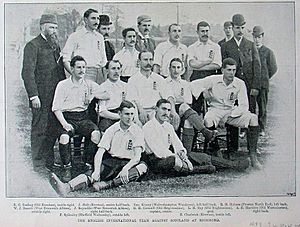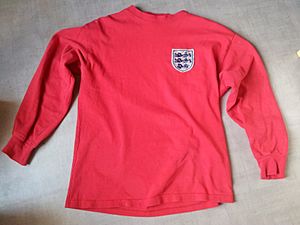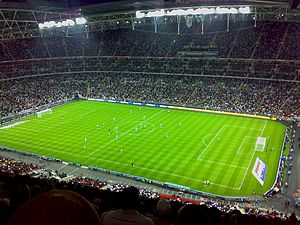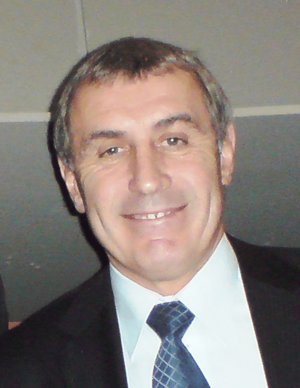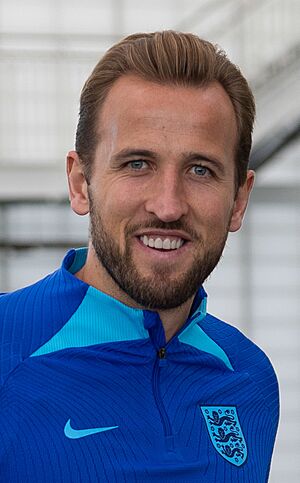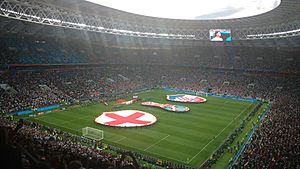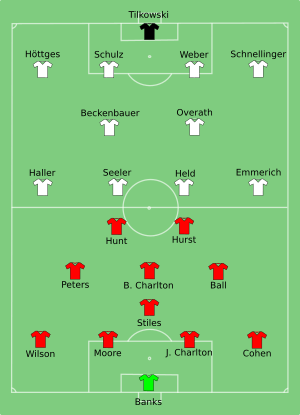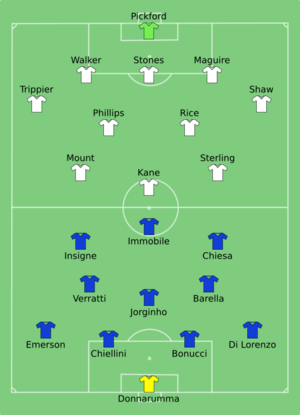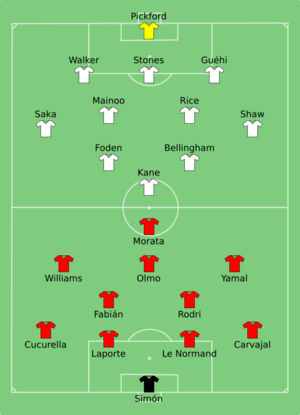England national football team facts for kids
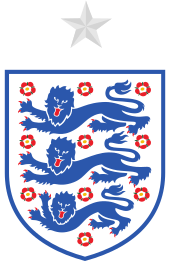 |
|||||||||||||||||||||||||||||
| Nickname(s) | The Three Lions | ||||||||||||||||||||||||||||
|---|---|---|---|---|---|---|---|---|---|---|---|---|---|---|---|---|---|---|---|---|---|---|---|---|---|---|---|---|---|
| Association | The Football Association (The FA) |
||||||||||||||||||||||||||||
| Confederation | UEFA (Europe) | ||||||||||||||||||||||||||||
| Head coach | Thomas Tuchel | ||||||||||||||||||||||||||||
| Captain | Harry Kane | ||||||||||||||||||||||||||||
| Most caps | Peter Shilton (125) | ||||||||||||||||||||||||||||
| Top scorer | Harry Kane (73) | ||||||||||||||||||||||||||||
| Home stadium | Wembley Stadium | ||||||||||||||||||||||||||||
| FIFA code | ENG | ||||||||||||||||||||||||||||
|
|||||||||||||||||||||||||||||
| FIFA ranking | |||||||||||||||||||||||||||||
| Current | 5 |
||||||||||||||||||||||||||||
| Highest | 3 (August–September 2012, September–October 2021, November 2023) | ||||||||||||||||||||||||||||
| Lowest | 27 (February 1996) | ||||||||||||||||||||||||||||
| Elo ranking | |||||||||||||||||||||||||||||
| Current | 7 |
||||||||||||||||||||||||||||
| Highest | 1 (1872–1876, 1892–1911, 1966–1970, 1987–1988) |
||||||||||||||||||||||||||||
| Lowest | 17 (11 June 1995) | ||||||||||||||||||||||||||||
| First international | |||||||||||||||||||||||||||||
(Partick, Scotland; 30 November 1872) (The first ever international football match) |
|||||||||||||||||||||||||||||
| Biggest win | |||||||||||||||||||||||||||||
(Belfast, Ireland; 18 February 1882) |
|||||||||||||||||||||||||||||
| Biggest defeat | |||||||||||||||||||||||||||||
(Budapest, Hungary; 23 May 1954) |
|||||||||||||||||||||||||||||
| World Cup | |||||||||||||||||||||||||||||
| Appearances | 16 (first in 1950) | ||||||||||||||||||||||||||||
| Best result | Champions (1966) | ||||||||||||||||||||||||||||
| European Championship | |||||||||||||||||||||||||||||
| Appearances | 11 (first in 1968) | ||||||||||||||||||||||||||||
| Best result | Runners-up (2020, 2024) | ||||||||||||||||||||||||||||
| Nations League Finals | |||||||||||||||||||||||||||||
| Appearances | 1 (first in 2019) | ||||||||||||||||||||||||||||
| Best result | Third place (2019) | ||||||||||||||||||||||||||||
|
Medal record
|
|||||||||||||||||||||||||||||
| Website | englandfootball.com | ||||||||||||||||||||||||||||
The England national football team represents England in international football matches. This team is one of the oldest in the world! They played their very first international game in 1872 against Scotland.
The team is managed by the Football Association (FA). They compete in big tournaments like the FIFA World Cup, the UEFA European Championship (also known as the Euros), and the UEFA Nations League. Their main home stadium is Wembley Stadium in London. The current Head Coach is Thomas Tuchel.
England famously won the World Cup in 1966, playing at home. They have reached the World Cup semi-finals two other times, in 1990 and 2018. While they haven't won the European Championship yet, they were runners-up in 2020 and 2024. England is special because they are the only team to win the World Cup but not their main continental championship.
Contents
The Story of England Football
How it All Began
The England men's football team is one of the oldest in the world. It started at the same time as the Scottish team. Their first official international match was on November 30, 1872, against Scotland. This game was played in Scotland. For many years, England only played against teams from Scotland, Wales, and Ireland.
At first, England did not have a permanent home stadium. They joined FIFA in 1906. They played their first games against other European countries in 1908. The original Wembley Stadium opened in 1923 and became their main home ground. England left FIFA for a while but rejoined in 1946. Because of this, they did not play in a World Cup until 1950. In that tournament, they lost to the United States and did not get past the first round.
In 1953, England had a tough loss at Wembley, losing 6–3 to Hungary. In the next game against Hungary, they lost 7–1. This is still England's biggest defeat ever. In the 1954 FIFA World Cup, England reached the quarter-finals for the first time. They lost to Uruguay.
Managers and World Cup Glory
Walter Winterbottom became England's first full-time manager in 1946. However, a committee still chose the team until Alf Ramsey became manager in 1963. The 1966 World Cup was held in England. Ramsey led England to win the trophy! They beat West Germany 4–2 in the final after extra time. Geoff Hurst scored three goals in that amazing match. In UEFA Euro 1968, England reached the semi-finals for the first time.
England automatically qualified for the 1970 World Cup as champions. They reached the quarter-finals but lost to West Germany. After failing to qualify for the 1972 and 1974 tournaments, Ramsey left his role.
New Managers and Memorable Matches
After Ramsey, Don Revie took over in 1974. The team struggled and did not qualify for the 1976 or 1978 major tournaments. Ron Greenwood became manager in 1977. Under him, England qualified for Euro 1980 and the 1982 World Cup.
Bobby Robson managed England from 1982 to 1990. In the 1986 World Cup, England reached the quarter-finals. They lost to Argentina in a famous game where Diego Maradona scored two very different goals. One was a controversial hand goal, and the other was an amazing solo effort. Gary Lineker was the top scorer of that World Cup.
In the 1990 World Cup, England had a great run, finishing fourth. They lost a close semi-final to West Germany in a penalty shoot-out. Even though they lost the third-place match, the team was celebrated as heroes back home.
The Nineties and New Challenges
The 1990s saw several managers for England. Graham Taylor took over after Robson. England struggled in Euro 1992 and did not qualify for the 1994 World Cup. Taylor then resigned.
Terry Venables became manager from 1994 to 1996. England hosted Euro 1996 and reached the semi-finals, but lost to Germany in a penalty shoot-out. Alan Shearer was the top scorer in that tournament. The song "Three Lions" became a huge hit with fans. Venables announced he would leave after the tournament due to some issues outside of football.
Glenn Hoddle then led England to the 1998 World Cup. They were knocked out by Argentina on penalties again. Hoddle was no longer the coach after some controversial comments he made. Kevin Keegan became the next manager and took England to Euro 2000, but the team left in the group stage, and he resigned soon after.
The Early 2000s and New Coaches
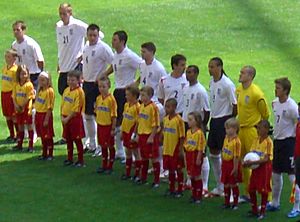
Sven-Göran Eriksson became England's first non-English manager, leading the team from 2001 to 2006. This period was called the "golden generation" of players. However, England was knocked out in the quarter-finals of the 2002 World Cup, Euro 2004, and the 2006 World Cup.
Steve McClaren took over after Eriksson. He was manager for only 18 matches. England did not qualify for Euro 2008, and McClaren left his position.
More Managers and Tough Losses
In 2007, Italian manager Fabio Capello became England's coach. At the 2010 World Cup, England lost 4–1 to Germany. This was their biggest World Cup defeat. A famous moment from this game was a "ghost goal" by Frank Lampard that was not given. This incident helped lead to the use of goal-line technology in football. Capello resigned in February 2012 after a disagreement with the FA.
Roy Hodgson became the new manager in May 2012. England reached the quarter-finals of Euro 2012, losing to Italy on penalties. In the 2014 World Cup, England left the tournament in the group stage. At Euro 2016, they lost to Iceland in the round of 16. Hodgson resigned after this match. Sam Allardyce then took over but left after only one game due to a disagreement with the FA. He was the shortest-serving England manager.
Recent Successes and New Leadership
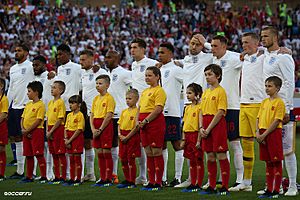
Gareth Southgate became the permanent manager in 2016. At the 2018 World Cup, England reached the semi-finals. They won a penalty shoot-out for the first time in a World Cup against Colombia. They finished fourth in the tournament. Harry Kane was the top scorer, winning the Golden Boot.
In November 2019, England played their 1000th international match, winning 7–0 against Montenegro.
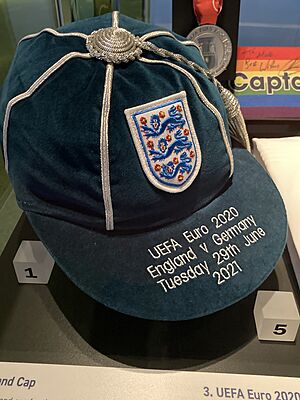
At Euro 2020 (played in 2021), England reached their first European Championship final. They beat Germany, Ukraine, and Denmark to get there. In the final at Wembley, they lost to Italy on penalties.
At the 2022 World Cup, England reached the quarter-finals. They were knocked out by France. Harry Kane scored his 53rd goal for England in that match, matching the all-time record.
At Euro 2024, England reached their second European Championship final in a row. They beat Slovakia, Switzerland, and the Netherlands. In the final, they lost 2–1 to Spain. Harry Kane was one of the top scorers in the tournament.
Gareth Southgate resigned as manager on July 16, 2024. Lee Carsley became the temporary coach. On October 16, 2024, the FA announced that Thomas Tuchel would become the new manager starting January 1, 2025.
Team Look and Feel
Team Kits and Crest
Kit Suppliers Over Time
| Kit supplier | Period |
|---|---|
| St. Blaize and Hope Brothers | 1949–1954 |
| Umbro | 1954–1961 |
| Bukta | 1959–1965 |
| Umbro | 1965–1974 |
| Admiral | 1974–1984 |
| Umbro | 1984–2013 |
| Nike | 2013–present |
Team Crest Details
The England team's badge features three lions. This symbol comes from King Richard I, who ruled a long time ago. In 1872, England players wore white shirts with this three-lion crest. The lions have changed slightly over the years. Since 2003, a star was added above the logo to celebrate England's 1966 World Cup win.
Team Colours
England's home kit is usually white shirts, navy blue shorts, and white or black socks. Sometimes, they wear all white.
Their traditional away kit is red shirts, white shorts, and red socks. In 1996, they tried a grey kit, but fans did not like it. So, the away kit went back to red until 2011, when a navy blue kit was introduced.
Home Stadium: Wembley
For many years, England played their home matches in different stadiums across the country. The original Empire Stadium was built in London in 1923.
England played their first game there in 1924 against Scotland. Wembley became England's permanent home stadium in the 1950s. The old stadium closed in 2000 and was rebuilt. During this time, England played at other stadiums like Old Trafford and St. James' Park.
The new Wembley Stadium opened in 2007. England's first match there was a draw with Brazil. The Football Association owns this stadium.
Team Rivalries
England has three main football rivalries: with Scotland, Germany, and Argentina.
The rivalry with Scotland is very old, starting with the first international match in 1872. It's a big part of the history between the two countries. However, this rivalry is not as strong as it used to be.
The rivalry with Germany is mostly important to English fans. Many English newspapers talk about past games, like England's 1966 World Cup win or penalty shoot-out losses in 1990 and 1996. Germans often see other teams like Italy or the Netherlands as bigger rivals.
The rivalry with Argentina is very competitive. Games between these teams are often memorable and sometimes controversial. This rivalry became more intense due to events outside of football, like the 1982 Falklands War.
Match Results and Upcoming Games
The following is a list of recent match results and any future matches that have been scheduled.
Win Draw Loss Fixture
2024 Matches
| 7 September 2024 2024–25 UEFA Nations League Group B2 | Republic of Ireland |
0–2 | Dublin, Ireland | |
| 17:00 BST (UTC+1) | Stadium: Aviva Stadium Attendance: 50,359 Referee: José María Sánchez (Spain) |
| 10 September 2024 2024–25 UEFA Nations League Group B2 | England |
2–0 | London, England | |
| 19:45 BST (UTC+1) |
|
Stadium: Wembley Stadium Attendance: 70,221 Referee: Morten Krøgh (Denmark) |
| 10 October 2024 2024–25 UEFA Nations League Group B2 | England |
1–2 | London, England | |
| 19:45 BST (UTC+1) |
|
Stadium: Wembley Stadium Attendance: 79,012 Referee: Andrea Colombo (Italy) |
| 13 October 2024 2024–25 UEFA Nations League Group B2 | Finland |
1–3 | Helsinki, Finland | |
| 19:00 EEST (UTC+3) |
|
Stadium: Helsinki Olympic Stadium Attendance: 32,411 Referee: Giorgi Kruashvili (Georgia) |
| 14 November 2024 2024–25 UEFA Nations League Group B2 | Greece |
0–3 | Athens, Greece | |
| 21:45 EET (UTC+2) | Stadium: Olympic Stadium Attendance: 60,664 Referee: Daniel Siebert (Germany) |
| 17 November 2024 2024–25 UEFA Nations League Group B2 | England |
5–0 | London, England | |
| 17:00 GMT (UTC±0) | Stadium: Wembley Stadium Attendance: 79,969 Referee: Erik Lambrechts (Belgium) |
2025 Matches
| 21 March 2025 2026 FIFA World Cup qualification | England |
2–0 | London, England | |
| 19:45 GMT (UTC±0) |
|
Stadium: Wembley Stadium Attendance: 82,378 Referee: Alejandro Hernández Hernández (Spain) |
| 24 March 2025 2026 FIFA World Cup qualification | England |
3–0 | London, England | |
| 19:45 GMT (UTC±0) |
|
Stadium: Wembley Stadium Attendance: 79,572 Referee: Orel Grinfeld (Israel) |
| 7 June 2025 2026 FIFA World Cup qualification | Andorra |
0–1 | Barcelona, Spain | |
| 18:00 CEST (UTC+2) |
|
Stadium: RCDE Stadium Attendance: 8,872 Referee: Igor Pajač (Croatia) |
| 10 June 2025 Friendly | England |
1–3 | Nottingham, England | |
| 19:45 BST (UTC+1) |
|
Stadium: City Ground Attendance: 26,350 Referee: Stéphanie Frappart (France) |
| 6 September 2025 2026 FIFA World Cup qualification | England |
v | Birmingham, England | |
| 17:00 BST (UTC+1) | Stadium: Villa Park |
| 9 September 2025 2026 FIFA World Cup qualification | Serbia |
v | Leskovac, Serbia | |
| 20:45 CEST (UTC+2) | Stadium: Dubočica Stadium |
| 14 October 2025 2026 FIFA World Cup qualification | Latvia |
v | Riga, Latvia | |
| 21:45 EEST (UTC+3) | Stadium: Skonto Stadium |
| 13 November 2025 2026 FIFA World Cup qualification | England |
v | London, England | |
| 19:45 GMT (UTC±0) | Stadium: Wembley Stadium |
| 16 November 2025 2026 FIFA World Cup qualification | Albania |
v | Tirana, Albania | |
| 18:00 CEST (UTC+1) | Stadium: Arena Kombëtare |
Coaching Staff
Here are the people who help manage and train the England football team.
| Position | Name |
|---|---|
| Manager | |
| Assistant manager | |
| Goalkeeping coach | |
| Coach | |
| First-team doctor | |
| Head of physical performance | |
| Physical performance coaches | |
| Nutritionist | |
| Head of performance medicine | |
| Lead performance doctor | |
| Lead physiotherapist | |
| Analyst | |
| Analyst | |
| Analyst | |
| Head of performance |
Meet the Players
Current Squad
These 25 players were chosen for the World Cup qualification match against Andorra and the friendly match against Senegal in June 2025.
Caps (games played) and goals are correct as of June 10, 2025, after the match against Senegal.
| No. | Pos. | Player | Date of birth (age) | Caps | Goals | Club |
|---|---|---|---|---|---|---|
| 1 | GK | Jordan Pickford | 7 March 1994 | 76 | 0 | |
| 13 | GK | Dean Henderson | 12 March 1997 | 3 | 0 | |
| 22 | GK | James Trafford | 10 October 2002 | 0 | 0 | |
|
|
||||||
| 2 | DF | Kyle Walker | 28 May 1990 | 96 | 1 | |
| 3 | DF | Reece James | 8 December 1999 | 19 | 1 | |
| 5 | DF | Ezri Konsa | 23 October 1997 | 12 | 0 | |
| 6 | DF | Levi Colwill | 26 February 2003 | 5 | 0 | |
| 12 | DF | Dan Burn | 9 May 1992 | 2 | 0 | |
| 16 | DF | Trent Alexander-Arnold | 7 October 1998 | 34 | 4 | |
| 21 | DF | Myles Lewis-Skelly | 26 September 2006 | 3 | 1 | |
| 23 | DF | Trevoh Chalobah | 5 July 1999 | 1 | 0 | |
|
|
||||||
| 4 | MF | Declan Rice | 14 January 1999 | 66 | 5 | |
| 7 | MF | Morgan Gibbs-White | 27 January 2000 | 4 | 0 | |
| 8 | MF | Jordan Henderson | 17 June 1990 | 84 | 3 | |
| 10 | MF | Jude Bellingham | 29 June 2003 | 44 | 6 | |
| 17 | MF | Curtis Jones | 30 January 2001 | 6 | 1 | |
| 18 | MF | Morgan Rogers | 26 July 2002 | 6 | 0 | |
| 20 | MF | Cole Palmer | 6 May 2002 | 12 | 2 | |
| 24 | MF | Conor Gallagher | 6 February 2000 | 22 | 1 | |
|
|
||||||
| 9 | FW | Harry Kane (captain) | 28 July 1993 | 107 | 73 | |
| 11 | FW | Anthony Gordon | 24 February 2001 | 12 | 1 | |
| 14 | FW | Ivan Toney | 16 March 1996 | 7 | 1 | |
| 15 | FW | Eberechi Eze | 29 June 1998 | 12 | 1 | |
| 19 | FW | Noni Madueke | 10 March 2002 | 7 | 0 | |
| 25 | FW | Bukayo Saka | 5 September 2001 | 44 | 12 | |
Recent Call-ups
These players have also been called up to the England squad in the last year.
| Pos. | Player | Date of birth (age) | Caps | Goals | Club | Latest call-up |
|---|---|---|---|---|---|---|
| GK | Aaron Ramsdale | 14 May 1998 | 5 | 0 | v. |
|
| GK | Nick Pope | 19 April 1992 | 10 | 0 | v. |
|
|
|
||||||
| DF | Marc Guéhi | 13 July 2000 | 23 | 0 | v. |
|
| DF | Tino Livramento | 12 November 2002 | 1 | 0 | v. |
|
| DF | Jarell Quansah | 29 January 2003 | 0 | 0 | v. |
|
| DF | Rico Lewis | 28 November 2004 | 5 | 0 | v. |
|
| DF | Lewis Hall | 8 September 2004 | 2 | 0 | v. |
|
| DF | Taylor Harwood-Bellis | 30 January 2002 | 1 | 1 | v. |
|
| DF | Jarrad Branthwaite | 27 June 2002 | 1 | 0 | v. |
|
| DF | John Stones | 28 May 1994 | 83 | 3 | v. |
|
| DF | Harry Maguire | 5 March 1993 | 64 | 7 | v. |
|
|
|
||||||
| MF | Angel Gomes | 31 August 2000 | 4 | 0 | v. |
|
| MF | Kobbie Mainoo | 19 April 2005 | 10 | 0 | v. |
|
|
|
||||||
| FW | Ollie Watkins | 30 December 1995 | 18 | 5 | v. |
|
| FW | Marcus Rashford | 31 October 1997 | 62 | 17 | v. |
|
| FW | Phil Foden | 28 May 2000 | 45 | 4 | v. |
|
| FW | Jarrod Bowen | 20 December 1996 | 16 | 1 | v. |
|
| FW | Dominic Solanke | 14 September 1997 | 3 | 0 | v. |
|
| FW | Jack Grealish | 10 September 1995 | 39 | 4 | v. |
|
|
INJ Withdrew due to injury |
||||||
Player Records
Most Games Played
| Rank | Player | Caps | Goals | Position | Career |
|---|---|---|---|---|---|
| 1 | Peter Shilton | 125 | 0 | GK | 1970–1990 |
| 2 | Wayne Rooney | 120 | 53 | FW | 2003–2018 |
| 3 | David Beckham | 115 | 17 | MF | 1996–2009 |
| 4 | Steven Gerrard | 114 | 21 | MF | 2000–2014 |
| 5 | Bobby Moore | 108 | 2 | DF | 1962–1973 |
| 6 | Ashley Cole | 107 | 0 | DF | 2001–2014 |
| Harry Kane | 107 | 73 | FW | 2015–present | |
| 8 | Bobby Charlton | 106 | 49 | MF | 1958–1970 |
| Frank Lampard | 106 | 29 | MF | 1999–2014 | |
| 10 | Billy Wright | 105 | 3 | DF | 1946–1959 |
Top Goal Scorers
| Rank | Player | Goals | Caps | Average | Career |
|---|---|---|---|---|---|
| 1 | Harry Kane (list) | 73 | 107 | 0.68 | 2015–present |
| 2 | Wayne Rooney (list) | 53 | 120 | 0.44 | 2003–2018 |
| 3 | Bobby Charlton (list) | 49 | 106 | 0.46 | 1958–1970 |
| 4 | Gary Lineker | 48 | 80 | 0.60 | 1984–1992 |
| 5 | Jimmy Greaves | 44 | 57 | 0.77 | 1959–1967 |
| 6 | Michael Owen | 40 | 89 | 0.45 | 1998–2008 |
| 7 | Nat Lofthouse | 30 | 33 | 0.91 | 1950–1958 |
| Alan Shearer | 30 | 63 | 0.48 | 1992–2000 | |
| Tom Finney | 30 | 76 | 0.39 | 1946–1958 | |
| 10 | Vivian Woodward | 29 | 23 | 1.26 | 1903–1911 |
| Frank Lampard | 29 | 106 | 0.27 | 1999–2014 |
Most Clean Sheets (Goalkeepers)
| Rank | Player | Clean sheets | Caps | Average | Career |
|---|---|---|---|---|---|
| 1 | Peter Shilton | 66 | 125 | 0.53 | 1970–1990 |
| 2 | Joe Hart | 43 | 75 | 0.57 | 2008–2017 |
| 3 | David Seaman | 40 | 75 | 0.53 | 1988–2002 |
| 4 | Jordan Pickford | 38 | 76 | 0.50 | 2017–present |
| 5 | Gordon Banks | 35 | 73 | 0.48 | 1963–1972 |
| 6 | Ray Clemence | 27 | 61 | 0.44 | 1972–1983 |
| 7 | Chris Woods | 26 | 43 | 0.60 | 1985–1993 |
| 8 | Paul Robinson | 24 | 41 | 0.59 | 2003–2007 |
| 9 | David James | 21 | 53 | 0.40 | 1997–2010 |
| 10 | Nigel Martyn | 13 | 23 | 0.57 | 1992–2002 |
Manager Records
| Rank | Manager | Winners | Runners-up | Semi-Finalists | Quarter-Finalists | Top 8 Finishes |
|---|---|---|---|---|---|---|
| 1 | Gareth Southgate | 0 | 2 (2020, 2024) | 1 (2018) | 1 (2022) | 4 |
| 2 | Alf Ramsey | 1 (1966) | 0 | 1 (1968) | 1 (1970) | 3 |
| 5 | Sven-Göran Eriksson | 0 | 0 | 0 | 3 (2002, 2004, 2006) | 3 |
| 4 | Bobby Robson | 0 | 0 | 1 (1990) | 1 (1986) | 2 |
| 3 | Walter Winterbottom | 0 | 0 | 0 | 2 (1954, 1962) | 2 |
| 6 | Terry Venables | 0 | 0 | 1 (1996) | 0 | 1 |
| 7 | Roy Hodgson | 0 | 0 | 0 | 1 (2012) | 1 |
Best Performance Champions Runners-up Semi-Finalists
Team Records
- Largest Win: 13–0 vs. Ireland, February 18, 1882
- Largest Loss: 1–7 vs. Hungary, May 23, 1954
- Longest Unbeaten Run: 22 games (November 18, 2020 to March 29, 2022)
- Longest Losing Run: 7 games (May 11, 1958 to October 4, 1958)
- Longest Winning Run: 10 games (June 6, 1908 to June 1, 1909)
- Longest Run Without Conceding a Goal: 7 games (June 2, 2021 to July 3, 2021)
Tournament History
FIFA World Cup
England first played in the 1950 FIFA World Cup. They have qualified for 16 World Cup tournaments in total. England is one of only eight countries to have won a World Cup title. They won their only World Cup in 1966 on home soil, beating West Germany 4–2 in the final.
England finished fourth in the World Cup in 1990 and 2018. They also reached the quarter-finals in 1954, 1962, 1970, 1986, 2002, 2006, and 2022.
England did not qualify for the World Cup in 1974, 1978, and 1994. Their earliest exit was in the first round in 1950, 1958, and 2014. In 2010, England had their biggest World Cup defeat, losing 4–1 to Germany.
| FIFA World Cup Record | Qualifying Record | Manager(s) | ||||||||||||||||
|---|---|---|---|---|---|---|---|---|---|---|---|---|---|---|---|---|---|---|
| Year | Round | Pos | Pld | W | D | L | GF | GA | Squad | Pld | W | D | L | GF | GA | |||
| Not a FIFA member | Not a FIFA member | None | ||||||||||||||||
| Group stage | 8th | 3 | 1 | 0 | 2 | 2 | 2 | Squad | 3 | 3 | 0 | 0 | 14 | 3 | Winterbottom | |||
| Quarter-finals | 7th | 3 | 1 | 1 | 1 | 8 | 8 | Squad | 3 | 3 | 0 | 0 | 11 | 4 | ||||
| Group stage | 11th | 4 | 0 | 3 | 1 | 4 | 5 | Squad | 4 | 3 | 1 | 0 | 15 | 5 | ||||
| Quarter-finals | 8th | 4 | 1 | 1 | 2 | 5 | 6 | Squad | 4 | 3 | 1 | 0 | 16 | 2 | ||||
| Champions | 1st | 6 | 5 | 1 | 0 | 11 | 3 | Squad | Qualified as hosts | Ramsey | ||||||||
| Quarter-finals | 8th | 4 | 2 | 0 | 2 | 4 | 4 | Squad | Qualified as defending champions | Ramsey | ||||||||
| Did not qualify | 4 | 1 | 2 | 1 | 3 | 4 | ||||||||||||
| 6 | 5 | 0 | 1 | 15 | 4 | Revie | ||||||||||||
| Second group stage | 6th | 5 | 3 | 2 | 0 | 6 | 1 | Squad | 8 | 4 | 1 | 3 | 13 | 8 | Greenwood | |||
| Quarter-finals | 8th | 5 | 2 | 1 | 2 | 7 | 3 | Squad | 8 | 4 | 4 | 0 | 21 | 2 | Robson | |||
| Fourth place | 4th | 7 | 3 | 3 | 1 | 8 | 6 | Squad | 6 | 3 | 3 | 0 | 10 | 0 | Robson | |||
| Did not qualify | 10 | 5 | 3 | 2 | 26 | 9 | Taylor | |||||||||||
| Round of 16 | 9th | 4 | 2 | 1 | 1 | 7 | 4 | Squad | 8 | 6 | 1 | 1 | 15 | 2 | Hoddle | |||
| Quarter-finals | 6th | 5 | 2 | 2 | 1 | 6 | 3 | Squad | 8 | 5 | 2 | 1 | 16 | 6 | Keegan, Wilkinson, Eriksson | |||
| 7th | 5 | 3 | 2 | 0 | 6 | 2 | Squad | 10 | 8 | 1 | 1 | 17 | 5 | Eriksson | ||||
| Round of 16 | 13th | 4 | 1 | 2 | 1 | 3 | 5 | Squad | 10 | 9 | 0 | 1 | 34 | 6 | Capello | |||
| Group stage | 26th | 3 | 0 | 1 | 2 | 2 | 4 | Squad | 10 | 6 | 4 | 0 | 31 | 4 | Hodgson | |||
| Fourth place | 4th | 7 | 3 | 1 | 3 | 12 | 8 | Squad | 10 | 8 | 2 | 0 | 18 | 3 | Allardyce, Southgate | |||
| Quarter-finals | 6th | 5 | 3 | 1 | 1 | 13 | 4 | Squad | 10 | 8 | 2 | 0 | 39 | 3 | Southgate | |||
| To be determined | To be determined | Tuchel | ||||||||||||||||
| Total | 1 Title | 16/22 | 74 | 32 | 22 | 20 | 104 | 68 | — | 122 | 84 | 27 | 11 | 314 | 70 | — | ||
- Champions Runners-up Third place Fourth place Hosted tournament
- Correct as of December 10, 2022
UEFA European Championship
England first entered the UEFA European Championship in 1964. They have qualified for eleven tournaments. England's best results were finishing as runners-up in both the 2020 (played in 2021) and 2024 tournaments. They also finished third in 1968 and reached the semi-finals in 1996, which they hosted.
England did not get past the first round in 1980, 1988, 1992, and 2000. They also failed to qualify for the finals in 1964, 1972, 1976, 1984, and 2008.
| UEFA European Championship Record | Qualifying Record | Manager(s) | ||||||||||||||||
|---|---|---|---|---|---|---|---|---|---|---|---|---|---|---|---|---|---|---|
| Year | Round | Pos | Pld | W | D | L | GF | GA | Squad | Pld | W | D | L | GF | GA | |||
| Did not enter | Did not enter | Winterbottom | ||||||||||||||||
| Did not qualify | 2 | 0 | 1 | 1 | 3 | 6 | Winterbottom, Ramsey | |||||||||||
| Third place | 3rd | 2 | 1 | 0 | 1 | 2 | 1 | Squad | 8 | 6 | 1 | 1 | 18 | 6 | Ramsey | |||
| Did not qualify | 8 | 5 | 2 | 1 | 16 | 6 | Ramsey | |||||||||||
| Did not qualify | 6 | 3 | 2 | 1 | 11 | 3 | Revie | |||||||||||
| Group stage | 6th | 3 | 1 | 1 | 1 | 3 | 3 | Squad | 8 | 7 | 1 | 0 | 22 | 5 | Greenwood | |||
| Did not qualify | 8 | 5 | 2 | 1 | 23 | 3 | Robson | |||||||||||
| Group stage | 7th | 3 | 0 | 0 | 3 | 2 | 7 | Squad | 6 | 5 | 1 | 0 | 19 | 1 | ||||
| 7th | 3 | 0 | 2 | 1 | 1 | 2 | Squad | 6 | 3 | 3 | 0 | 7 | 3 | Taylor | ||||
| Semi-finals | 3rd | 5 | 2 | 3 | 0 | 8 | 3 | Squad | Qualified as hosts | Venables | ||||||||
| Group stage | 11th | 3 | 1 | 0 | 2 | 5 | 6 | Squad | 10 | 4 | 4 | 2 | 16 | 5 | Hoddle, Keegan | |||
| Quarter-finals | 5th | 4 | 2 | 1 | 1 | 10 | 6 | Squad | 8 | 6 | 2 | 0 | 14 | 5 | Eriksson | |||
| Did not qualify | 12 | 7 | 2 | 3 | 24 | 7 | McClaren | |||||||||||
| Quarter-finals | 5th | 4 | 2 | 2 | 0 | 5 | 3 | Squad | 8 | 5 | 3 | 0 | 17 | 5 | Capello, Hodgson | |||
| Round of 16 | 12th | 4 | 1 | 2 | 1 | 4 | 4 | Squad | 10 | 10 | 0 | 0 | 31 | 3 | Hodgson | |||
| Runners-up | 2nd | 7 | 5 | 2 | 0 | 11 | 2 | Squad | 8 | 7 | 0 | 1 | 37 | 6 | Southgate | |||
| Runners-up | 2nd | 7 | 3 | 3 | 1 | 8 | 6 | Squad | 8 | 6 | 2 | 0 | 22 | 4 | ||||
| To be determined | To be determined | |||||||||||||||||
| Total | Runners-up | 11/17 | 45 | 18 | 16 | 11 | 59 | 43 | — | 116 | 79 | 26 | 11 | 270 | 68 | — | ||
- Champions Runners-up Third place/Semi-finalists Hosted tournament
- Correct as of July 14, 2024
UEFA Nations League
England has played in the UEFA Nations League since it started in 2018–19. They finished third in the 2019 finals, which is their best result in this competition so far.
| UEFA Nations League Record | |||||||||||||||||||||||
|---|---|---|---|---|---|---|---|---|---|---|---|---|---|---|---|---|---|---|---|---|---|---|---|
| League Phase | Finals | Manager(s) | |||||||||||||||||||||
| Season | Lg | Grp | Pos | Pld | W | D | L | GF | GA | P/R | Rnk | Year | Pos | Pld | W | D | L | GF | GA | Squad | |||
| 2018–19 | A | 4 | 1st | 4 | 2 | 1 | 1 | 6 | 5 | 4th | 3rd | 2 | 0 | 1 | 1 | 1 | 3 | Squad | Southgate | ||||
| 2020–21 | A | 2 | 3rd | 6 | 3 | 1 | 2 | 7 | 4 | 9th | Did not qualify | Southgate | |||||||||||
| 2022–23 | A | 3 | 4th | 6 | 0 | 3 | 3 | 4 | 10 | 15th | |||||||||||||
| 2024–25 | B | 2 | 1st | 6 | 5 | 0 | 1 | 16 | 3 | 17th | Carsley | ||||||||||||
| Total | 22 | 10 | 5 | 7 | 33 | 22 | 4th | Total | 1/4 | 2 | 0 | 1 | 1 | 3 | — | — | |||||||
- Champions Runners-up Third place Fourth place
- Correct as of November 17, 2024
Team Achievements
Major Competitions
- FIFA World Cup
 Champions (1): 1966
Champions (1): 1966
- UEFA European Championship
- UEFA Nations League
 Third place (1): 2019
Third place (1): 2019
Regional Titles
- British Home Championship
- Champions (54)
- Outright winners (34): 1888, 1891, 1892, 1893, 1895, 1898, 1899, 1901, 1904, 1905, 1909, 1911, 1913, 1930, 1932, 1938, 1947, 1948, 1950, 1954, 1955, 1957, 1961, 1965, 1966, 1968, 1969, 1971, 1973, 1975, 1978, 1979, 1982, 1983
- Shared (20): 1886, 1890, 1903, 1906, 1908, 1912, 1927, 1931, 1935, 1939, 1952, 1953, 1956, 1958, 1959, 1960, 1964, 1970, 1972, 1974
- Champions (54)
Friendly Tournaments
- Rous Cup
- Champions: 1986, 1988, 1989
- England Challenge Cup
- Champions: 1991
- Tournoi de France
- Champions: 1997
- FA Summer Tournament
- Champions: 2004
Awards
Summary of Major Honours
| Competition | Total | |||
|---|---|---|---|---|
| FIFA World Cup | 1 | 0 | 0 | 1 |
| UEFA European Championship | 0 | 2 | 1 | 3 |
| UEFA Nations League | 0 | 0 | 1 | 1 |
| Total | 1 | 2 | 2 | 5 |
See also
 In Spanish: Selección de fútbol de Inglaterra para niños
In Spanish: Selección de fútbol de Inglaterra para niños
- England women's national football team
- England national football team manager


